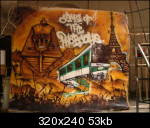"As the oil and gas drilling technique called hydraulic fracturing (or “fracking”) proliferates, a new study on the contents of the fluids involved in the process raises concerns about several ingredients. The scientists presenting the work today at the 248th National Meeting & Exposition of the American Chemical Society (ACS) say that out of nearly 200 commonly used compounds, there’s very little known about the potential health risks of about one-third, and eight are toxic to mammals."
A new look at what’s in “fracking” fluids raises red flags
Should strengthen France's reticence to"easy money" Fracking.
Wish I could say the same for UK.
Then again if the major players show a bad example what is one to expect from the smaller economies
And this applies to all activities so badly battered by the poor example of the "so called powers to be from politics (leading by 'bad' example) to athletics (IAAF's interpretation of sportsmanship in the 3000m steeple in Zurich 2014) through the major offender- Soccer (blind to obvious benefits to sportsmanship through video support for refereeing_well proven in Rugby).
Who said we must green our economies: control GHG emissions, keep our seas & oceans free from pollution, prepare or avoid sea level increases.....
A budget was calculated by ex-World Bank Chief Ecomomist_Sir Nicolas Stern
Business as Usual is Not an Option - NYU Stern School of Business
Research Headlines - Nowe narzędzia pozwolą podmiotom zarządzania
kryzysowego poprawić skuteczność swoich działań
-
[image: Image]Sprawne reagowanie na kataklizmy wymaga intensywnych szkoleń,
skutecznych technologii i niezawodnych strategii. Zaprojektowane przez
twórców ...
4 years ago








